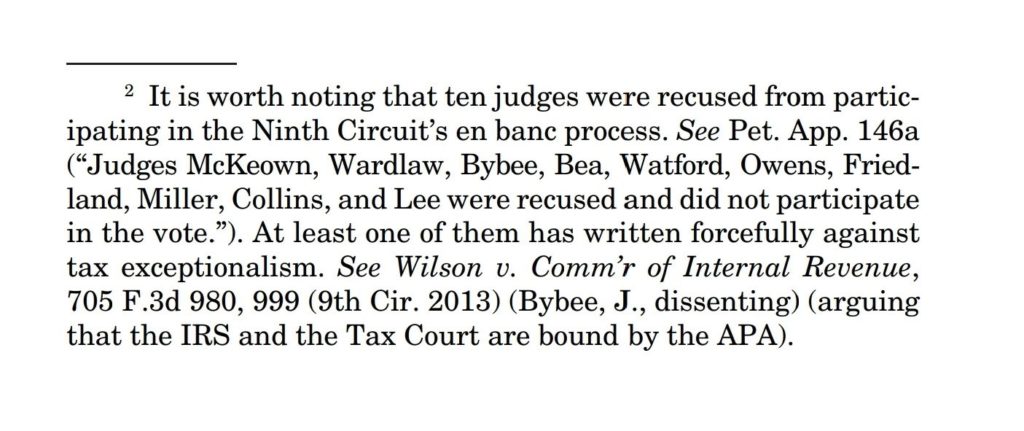Altera v. IRS: Major Tax and Administrative Law Cert Petition Before the Supreme Court
Last month Susan Morse and Stephen Shay had a great post about a pending cert petition before the Supreme Court in Altera Corp. v. Commissioner of Internal Revenue. The cert petition has been distributed for the Court’s conference on June 18th.
I am very interested in the intersection between tax and administrative law, and I’ve written on tax exceptionalism in the past. So I’ve been following this case closely, and in ordinary circumstances I’d be blogging about it quite a bit. But in this case, I serve as counsel of record for one of the amici in support of the petition, and I try not to mix my academic and lawyer hats on the blog (or elsewhere).
But I did want to flag for readers that Altera has filed its rely brief, which you can access here. Here’s the introduction to the reply brief:
The decision below expands agency deference far beyond the breaking point. The government took one position in rulemaking, and another in litigation. A panel of the Ninth Circuit not only accepted the government’s new position, but gave it Chevron deference. The effect was to allow the government to make a sea change in tax law without providing any notice of the change or opportunity to comment on it. Enough is enough; it is time for this Court to step in.
This case is undeniably important. The government does not dispute that the decision below will have a multi-billion-dollar impact on American businesses. Nor does it dispute that the stock-based compensation issue affects many companies in a wide range of industries. And the government cannot dispute the significance of the Ninth Circuit’s administrative law holdings. Nineteen federal judges found the government’s position indefensible – including fifteen judges of the Tax Court, in an opinion notable for its “uncommon unanimity and severity of censure.” Pet. App. 165a (Smith, J., dissenting from denial of rehearing).
Against that backdrop, the government’s response is to argue the merits. The government claims that it followed all of the rules applicable to administrative agencies, because its new position was apparent from the rulemaking record all along. The government’s reimagining of this case blinks reality. The arm’s-length standard always has depended on how unrelated parties behave in the real world, and nothing in the administrative record gave notice of the government’s supposed intent to abandon that settled understanding. The Court need not take Altera’s word for it; none of the companies, industry groups, or tax professionals that participated in the rulemaking noticed this supposed change. Nor did any of the fifteen Tax Court judges.
The government made up a new rationale for the regulation in litigation, and the Ninth Circuit deferred to it under Chevron. The government says this was perfectly fine, because a court may address Chevron first. That misses the point. The problem is that the Ninth Circuit used Chevron to excuse compliance with the Administrative Procedure Act. When a regulation is invalid under the rationale the agency advanced during rulemaking, a court may not resurrect it on some newly imagined basis. This Court should grant certiorari to review the Ninth Circuit’s extravagant expansion of Chevron.
The Ninth Circuit’s decision has created massive uncertainty for multinational companies. The largest global accounting firms have taken the unprecedented step of asking this Court to weigh in. Over a dozen former foreign tax officials have warned that the decision below will spawn international tax disputes and lead to double taxation. The government says wait for another case, but it identifies no other case in the pipeline. The issues have been fully vetted; there is no reason to wait. The Court should grant certiorari now.
6/5/2020 8:45PM Update: A couple readers astutely noted surprise that only three Ninth Circuit judges dissented from the denial of rehearing en banc. As we note in the amicus brief in support of the petition, ten of the active judges were recused:




